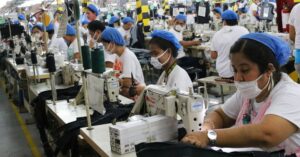Independent think-tank IBON Foundation said while the employment rate in the country is improving based on the current numbers released by the Philippine Statistic Authority (PSA), most of the jobs available are not paying well.
“If the employment situation is improving, why is poverty getting worse? Research group IBON asked this in reaction to the June 2024 labor force survey results. This must be because most jobs being created pay so low that millions of Filipinos still do not earn enough to pay for their basic needs, especially amid high prices and rising inflation,” said IBON in its recently published analysis.
The PSA’s June Labor Force Survey (LFS) results showed a substantial increase in the number of Filipinos who are employed. The LFS recorded a 1.8 million increase in the number of employed Filipinos last June 2024 at 50.3 million, from 48.8 million in the same period last year. Moreover, the number of unemployed decreased by 707,000 from 2.3 million to 1.6 million, based on the June LFS results. On the other hand, the underemployed persons meanwhile grew by 208,000 from 5.9 million to 6.1 million in the same period.
The LFS results also showed an improvement in the quality of jobs available for the Filipino workforce. Based on the LFS, by class of worker, there was a 2.0 million increase in the number of wage and salary workers, largely due to a 2.6 million jump in private establishment workers to 25.8 million which offset the 553,000 decline in public sector workers. Meanwhile, by hours worked, those employed in full-time work grew by 3.1 million to 34.8 million, while part-time workers fell by 1.5 million to around 15 million.
While the numbers are good, IBON argued, 1.3 million or an overwhelming 89% of the net increase in the number of employed persons was in sectors paying below the national average daily basic pay (ADBP). The independent think-tank also pointed out that only 163,000 or 11% of the net increase was in sectors paying above the national ADBP.
“The most jobs created in June 2024 from the year before were in construction which grew by 938,000 to 5.8 million; wholesale and retail trade which grew by 527,000 to 10.6 million; accommodation and food service activities which grew by 396,000 to 2.6 million; and manufacturing which grew by 353,000 to 3.9 million,” IBON analysis stated.
“Those four subsectors with an increase in jobs are among the six worst paying in the country, said the group, with an average daily basic pay of Php540 for construction, Php470 for wholesale and retail trade, Php486 for accommodation and food service, and Php546 for manufacturing. These are all far below the national ADBP of Php616,” it further explained.
IBON also noted that when it comes to pay, the compensation in these areas was only higher than in “other service activities” (Php351) and agriculture (Php344).
“These wages are not even half of the Php1,207 family living wage (FLW) estimated by IBON as of July 2024. With such low wages, IBON said that it is no wonder that many Filipino families have a hard time keeping up with the rising cost of living,” IBON noted. “This lack of decent pay amid high prices is pushing more Filipinos into hunger and poverty, said the group. Despite supposedly improving employment conditions, the number of self-rated poor families grew by 3.5 million to 16 million (58% of families) in June 2024 from the same period the year before, according to the Social Weather Stations (SWS). Filipino families experiencing involuntary hunger meanwhile rose by 2 million to 4.9 million (18% of families) in June 2024.”
IBON also criticized the Ferdinand Marcos Jr. administration for hyping a “robust and resilient labor market,” saying it means little as more Filipino workers are grappling with low pay and poverty. (NOEL SALES BARCELONA)




